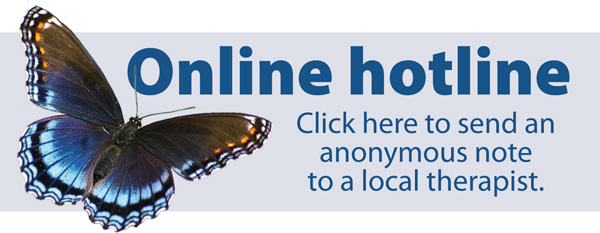How can I tell the difference between normal teenage moodiness and something more serious? I’m amazed at how my 15-year-old son can be a happy kid one day and then be sullen, irritable or gloomy the next day. I’ve got emotional whiplash! He seems to be in a “what’s the point of school, grades, college, etc.” phase of life right now, and I don’t know if that’s normal or if I should be concerned. I don’t want to overreact but I don’t want to miss red flags either. Got any advice?
Response by Carla Jones, LMFT, LPC
Thank you so much for reaching out and asking a question many parents have while raising a teenager. As you may recall, moving through your teenage years is challenging, even in the very best of circumstances. We expect some ups and downs while raising a teenager, but sometimes it’s hard to tell whether something more serious is happening.
From the brief information you provided, you’re identifying mood swings, irritability, and maybe even some pessimism or hopelessness. Beyond the dismissive and unhelpful, “congratulations you have a teenage son,” there are a few ways we can try to answer this. While all of these signs can be components of behavioral health problems, such as depression, it might be useful to frame the response within normal adolescent development.
There are three primary developmental milestones teens go through: physical, cognitive, and social. Each of these milestones has challenges and can contribute to that feeling of emotional whiplash you’re describing.
There’s not space here to overview each area, but we’ll point out an example or two when normal development can run up against the red flags you want to catch. One thing to remember, you’re going to miss those red flags if you’re not spending time with your son and asking him sometimes difficult and direct questions.
Physical
I am sure you are aware of some of the physical changes that are already happening with your son’s body. Body image is a big deal during this period and impacts how well he navigates healthy social and sexual development. It’s normal for him to be concerned and a little insecure about how he looks, and every teenager has probably at some point thought he/she has some sort of physical defect. It becomes a problem when those negative views about appearance become pervasive. This blends with the milestone below, but a consuming negative view of self can be a sign of a depression. Separate but related to the physical milestones are physical signs of mental health issues. Rapid weight gain or loss can be cause for concern, as can excessive dieting or exercise. And while an increase in sleeping can be a sign of depression, it is normal in adolescence to need more sleep. Insomnia, however, may be more of a concern and can impact decision making and impulsivity. Those are just a few of the areas to be aware of.
Cognitive
One of the “jobs” of adolescence is developing a sense of self or identity and direction. All adolescents have some struggle with balancing that need for personal growth and autonomy with a desire to still feel connected to and supported by family. That creates tension, especially when part of your job is to help keep him safe. You are also going to see some resistance and defiance as a normal part of this period of development. Although teens may say they do not need structure, this is a time when structure is very important. Teenagers need to know and feel their parents are providing them with stability, structure and consistence. (Remember teens are not yet ready to enter the adult world. They still need your guidance and support more now than ever.)
Alternately, that struggle between dependence and independence and trying to figure out what the future holds can, at times, look like or become pessimism or hopelessness. It is a problem when there is not the dynamic movement in development and a child gets stuck in a belief that he/she is not capable of success in the future. That pervasive negative view of the future can also be a sign of depression and other behavioral health issues.
Social
We talked about how some rapid changes in weight or behaviors can be a cause for concern. What about rapid changes in appearance or friends? Usually not. (Wearing inappropriate/excessive dress for weather, however, can be an indicator of mental health concerns and can be done to cover up cutting or other self-harm.) Part of forming identity for your son is going to include trying different ones on. Appearance will change. Friends will change. Your son is going to start viewing himself through the eyes of his peers more so than how you have helped define him. Understanding that’s part of normal development is also part of your job, as is balancing that understanding with maintaining some structure. A red flag may be when relationships or peer groups become unhealthy through inappropriate risk taking (some risk taking is also normal). Another flag would be if your son has a completely negative view of others or feels like he does not have anything to offer to friends or a peer group. The feeling of belonging is a huge protector against depression and other mental health concerns.
Risk
We’ve not talked about this, but adolescents are more impulsive. That can put them more at risk of harming themselves when they are not successfully moving through those developmental milestones and may have developed mental health issues. Feelings of not belonging, negative views of self, and others, and the future, can be indicators of depression or other problems. There’s not an expectation that you as a parent are going to make diagnostic assessments or complete comprehensive risk assessments. What you can do is note when you are worried and ask the hard questions. If after some reflection you have concern about your son’s well-being, it’s okay to say something like: “hey, I’m noticing that you’re struggling here. Sometimes when kids go through tough times they have thoughts they might not normally have. One of those thoughts can be about hurting or killing themselves. Are you having thoughts of hurting or killing yourself?” It may feel uncomfortable, but when needed, it’s important to ask the question. You can even provide some resources such as the National Suicide Prevention Lifeline at 1.800.273.8255. http://suicidepreventionlifeline.org/ He may not agree to using it immediately, but he may hold on to it.
Communication
Even if there is not the concern about depression or self-harm, keeping those lines of communication open is essential. There are some basic ways to do this. First, just try to sit down and have a conversation with your child. Make sure it is a time that he is receptive to talking (sometimes it’s hard to find that time), but you know your teenager best. Remember teenagers will be resistant so approach with love and kindness, reminding him that you love him and care about his life struggles. Focus on listening to your child, not responding, to hear what they have to say. Listening to your teen is one of the best tools you have. Teens want to be heard, as this allows them to feel what they have to say is important. Keep an open mind and make sure you don’t let their behaviors push your buttons or cause you to become defiant or defensive. (Remember they are testing everything just like we did as a teen.)
Help
If you have concerns or have identified some risk after talking to your child, please reach out to a mental health professional. A professional can help a teenager who is stuck or struggling. Thank you so much for your question and Happy Holidays to you and your family.
Therapists at Ozark Guidance would be happy to answer your questions and read what’s on your mind. Click the butterfly icon below to fill out an anonymous submission form with your question or concern. The form contains NO identifying information and is designed to give local women an online place to share concerns with a person qualified to offer feedback.
 Disclaimer: This RESPONSE does not provide medical advice It is intended for informational purposes only. It is not a substitute for professional medical advice, diagnosis or treatment. Never ignore professional medical advice in seeking treatment because of something you have read on nwaMotherlode or Ozark Guidance websites.
Disclaimer: This RESPONSE does not provide medical advice It is intended for informational purposes only. It is not a substitute for professional medical advice, diagnosis or treatment. Never ignore professional medical advice in seeking treatment because of something you have read on nwaMotherlode or Ozark Guidance websites.






